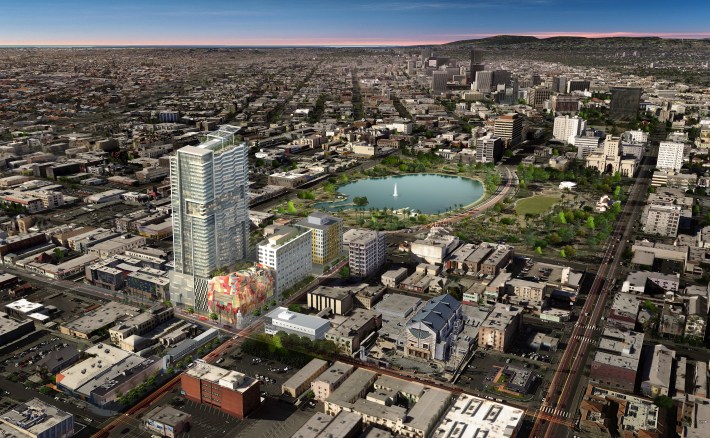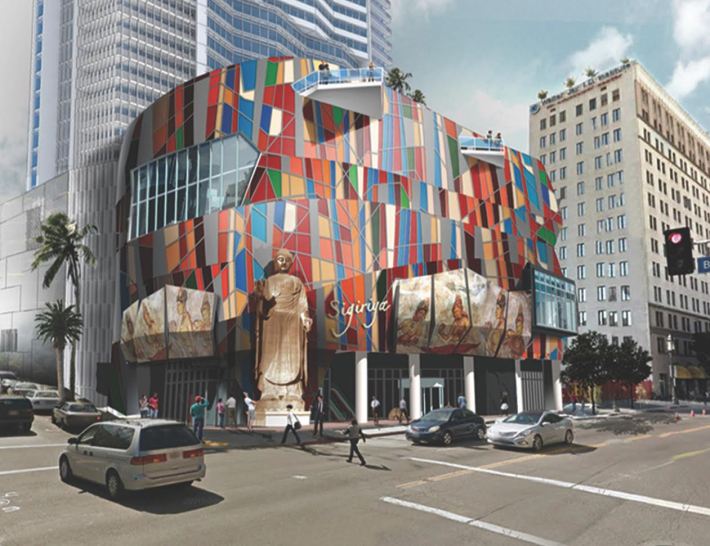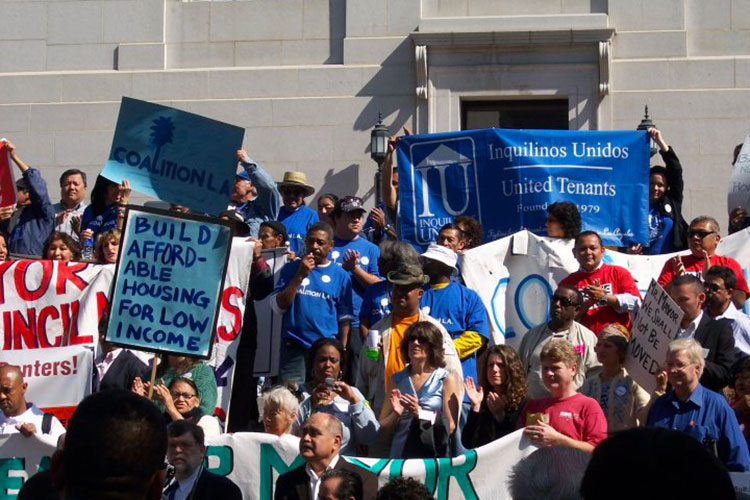Tomorrow, October 12, will be the 525th anniversary of Columbus’ landing in America, a momentous event in world history. It is also when the City Planning Commission will support or deny another entrepreneur’s enterprise of great social consequence, if on a smaller scale: the “Lake on Wilshire” project in the heart of Westlake. One block from MacArthur Park, the proposed megaproject includes a 41-story, 478-unit luxury apartment tower, a 220-room hotel, an 850-seat performing arts space, and the usual retail and meeting spaces. The undeniably upscale vision juxtaposed against the blend of characteristics that make the Westlake community one of the most vulnerable in Los Angeles has the potential to mark a significant turning point in the lives of thousands of families who struggle to maintain their foothold in the city.
Westlake has largely been spared the gentrification seen elsewhere with the arrival of relatively affluent new neighbors or of a single huge development project and the soaring rents capable of uprooting longtime residents that follow in their wake. Served by the Red Line, between downtown and Koreatown, rents have risen here, too, and sent many a family packing, while worsening the hardship and overcrowding among those who stay. Still, it had remained a relatively opaque region on the map of urban imperialism, giving temporary respite to many others in the poorest echelons of L.A.’s working class. Until now.

Few places in the United States match the collective disenfranchisement glimpsed in Westlake’s demographic profile. In 2015, according to the U.S. Census, the 90057 zip code, which covers the central and largest part of the neighborhood, had a median household income of $27,890, a poverty rate of 36.5 percent, and severe overcrowding in over 30 percent of renter households. In 2010, it had reported that renter households were 96 percent. Such is the case in a metropolitan area where, as it is, rents in black and brown communities consume 63 percent of a household’s income. Finally, a UCLA Labor Center study on Westlake and neighboring Pico Union revealed in 2015 that households with an annual income below $15,000 made up 23 percent, and that, aside from having a Latino-immigrant majority, 44 percent of both districts’ population consisted of undocumented immigrants.
The latter has implications for housing policymakers, since undocumented people are barred from government benefits and often lack paperwork required by private institutional providers. It also helps explain why so many in Westlake work as street vendors to survive. And given the widespread fear and distrust that haunt the community, a report based heavily on self-reported information may well be understating the challenges.
Adding to the specter accompanying the "Lake on Wilshire" project (LOW), plans for a hotel in what is currently an office building involve displacing several organizations that serve local needs, including two of the city’s most important tenant-rights centers: Inquilinos Unidos and Eviction Defense Network. The two nonprofits have been critical in the fight against evictions and slum conditions, as well as in educating renters about their rights and responsibilities. We all know that the LOW would trigger skyrocketing rents in the area, further incentivizing landlords to push out tenants, but nobody knows what will happen after anti-displacement lawyers and organizers have themselves been displaced.

Unlike several other projects its size, the LOW comes with no Community Benefits Agreement (CBA) to soften its impact on the community. Despite demands for housing affordable to locals at the LOW, the bare-bones Development Agreement includes only the 39 Very Low-Income (VLI) units required under the Density Bonus program. Either way, VLI housing, requiring an income for a 4-person family ranging from $27,051 to $45,050, automatically excludes most people in Westlake. All other units would be priced at market rates, currently estimated at $2,112 for a 1-bedroom and $3,328 for a 2-bedroom. Instead of a CBA, the LOW—whose reported construction costs are $213.8 million—includes promises of limited, and somewhat dubious, social value:
- $2 million to renovate an existing transitional shelter for women (good, but will lead to no new housing),
- $450,000 for the 1st District’s Public Benefits Trust Fund (good, but nobody knows how it will be spent),
- $30,000 for future hotel employees’ job training (good, but it serves the employer just as much), and
- $20,000 for the LAPD to install surveillance cameras within a 2-block radius of the project (no comment).
The developer is Walter Jayasinghe, or “Dr. J”, a well-known plastic surgeon and major local property owner who recently turned 80. Founder of the Sri Lanka Foundation, whose cultural activities include a Miss Sri Lanka America beauty pageant, he was named 2016’s “philanthropist of the year” by the Sri Lankan Medical Association of North America-West “for his desire to promote the welfare of others, generosity, kindness and humanitarianism.”
The LOW’s website states that Dr. J ran a free clinic “every Saturday for many years” that catered to the homeless population around the downtown area and still raises funds for various humanitarian needs in his native Sri Lanka. Yet, there is no mention of caring about what Westlake residents most urgently need right now. His largesse has instead been directed toward the development of houses of worship - the acquisition or construction of several Buddhist temples, including several here in Southern California, and he played a “key role in setting up” the Dianetics Centre of Sri Lanka.
Dr. J’s generosity toward various causes may reflect genuinely held humanitarian values, even if some of us disagree on how to best promote the welfare of others. But at the end of the day, one private citizen’s values and intentions shouldn’t figure so heavily into city and neighborhood planning decisions that have the potential to affect so many lives so fundamentally. Perhaps this is the best argument for why the city government shouldn’t delegate its duties as the steward of equitable, humane urban development guided by a comprehensive understanding of its residents’ needs to market forces or even to well-intended philanthropists.
Thus, the question: Have the people of Westlake been left to fend for themselves?
Los Angeles City Councilmember Gil Cedillo—who represents the 1st District, including Westlake—is known for his pro-immigrant, pro-labor stances, but he has consistently sided with developers since joining the City Council, even dismissing gentrification as “a myth.” He has thus far been silent on the LOW project, but the fact that the developer accepted labor unions’ fair-wage demands for future employees could persuade him (after all, he has long relied on union support for winning elections). As the district’s representative, he has tremendous influence over development here, and more so because he is on the City Council’s Planning & Land Use Management Committee, which must approve any project that gets past the (notoriously pro-business) planning commission.
Unlike Dr. J, Mr. Cedillo was actually elected, and recently re-elected, to represent the interests of some of the most vulnerable people in the country, like those in Westlake. His values and intentions do matter because how he chooses to act in this matter will ultimately determine the life chances of tens of thousands of his constituents: Families forced from their homes may need to move to a faraway city altogether to find new jobs and a new community--often in a city with poorer schools, fewer services, and fewer transit connections. The stress that accompanies displacement also often makes it hard for families to remain intact.
How Cedillo acts may also determine how he is remembered by posterity. Has he supported labor causes all these years only because he could get something in return? Did he champion immigrant rights in Sacramento because there was little risk in doing so? Was he an early supporter of LGBT rights because he knew it was the civil-rights issue of tomorrow? Is he willing now to do something to prevent an impending humanitarian disaster—to be suffered by many immigrants, workers, and LGBT folks who will be left in need of shelter—even if there is nothing in it for him?
Years ago, in response to an interviewer’s question, Dr. J remarked, “The American dream is a reality that anyone could achieve with honest hard work. Set a goal and go for it!” The renters of Westlake, and throughout Los Angeles, are indeed honest, hardworking people who pay the full price of the housing they live in, and then some. Now it is time for policymakers to ensure that they are not cheated from reaching their most cherished goals and dreams.
Jesús Hermosillo is a former organizer and researcher for labor unions and housing-rights organizations, including Inquilinos Unidos. He has a master's degree in urban planning from UCLA. Raised in Boyle Heights, he is the only remaining member of his family in Los Angeles, thanks to the rising cost of housing.






